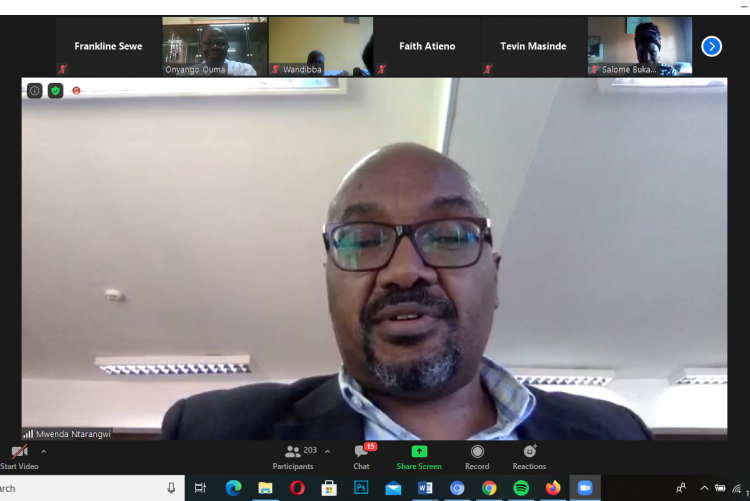The Institute of Anthropology, Gender and African Studies on November 23, 2020 held a highly successful and exciting webinar titled, “Anthropology Today-Repositioning the Discipline of Anthropology in the Global discourse. The webinar was part of the UoN@50 celebrations.
The webinar was well attended with over 200 participants including current students, alumni, staff, members of the public and scholars from across the world. While officially opening the event, DVC Research, Innovation and Enterprise, Prof. Horace Ochanda said that Anthropology was a key link between life sciences and humanities. “To clearly understand the relationships between life sciences and humanities you need Anthropology.’’ He remarked. The DVC further noted that anthropology provided the possibility to study every aspect of human existence and that it was the window to into the unknown. “Anthropology provides the answer to our questions about ourselves, our past, present and future and at the same time helps to connect everyone across the world.’’ He said.
Prof Mwenda Ntaragwi, CEO, Commission for University Education in his keynote presentation reviewed the history of Anthropology and Anthropological studies in Kenya. Prof Ntaragwi noted that the study of Anthropology in Kenya is heavily rooted in the colonial legacy and the field today faces myriad of challenges which need to be tackled head on. "Anthropology today is accosted by many challenges including the need to justify its relevance" He said. Prof. Ntaragwi lamented that Anthropology has never had a moment of peace and accused anthropology scholars of hiding in other development oriented fields instead of maximizing the use of ethnographic research.
Another keynote presenter, Prof. Cheparukha Kusimba said that Anthropology was an all-inclusive field and that without Anthropology no one would be able to speak of what it means to be African. A Professor of Anthropology at the University of South Florida-Tampa and St Petersburg USA, Prof. Kusimba cautioned the government among other policy makers against scrapping of funding for social science courses in higher education. “Even as we think about cutting funding for Non-STEM courses, we need to ask ourselves whether we have adequate innovations and inventions emerging from STEM programs that we can be proud of as Kenyans.” He said. However Prof. Kusimba also urged students and anthropology graduates to stay on top of their game. “In order to remain relevant in its mission to understand our diverse universe, anthropologists must continue to embrace interdependence and interdisciplinarity.” He said.
In her presentation, Dr Mary Nyamongo, Executive Director and founder AIHD Kenya lamented the fact that Anthropologist were not aggressive enough in taking up policy and decision making opportunities, “As anthropologists we need to clearly understand the critical role we are playing so that we gain more respect in the discipline.” She said.
Dr Kevin Bardosh an anthropologist and public health researcher from the University of Washington USA spoke about 5G in time of Covid-19: Corporate Power, wireless radiation and grassroots resistance in the 4th industrial revolution.





